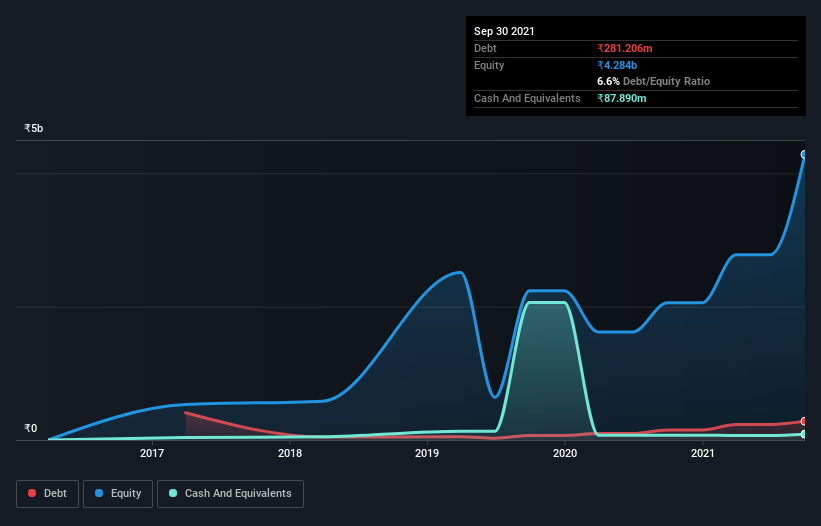Would Palash Securities (NSE:PALASHSECU) Be Better Off With Less Debt?
Legendary fund manager Li Lu (who Charlie Munger backed) once said, 'The biggest investment risk is not the volatility of prices, but whether you will suffer a permanent loss of capital.' It's only natural to consider a company's balance sheet when you examine how risky it is, since debt is often involved when a business collapses. As with many other companies Palash Securities Limited (NSE:PALASHSECU) makes use of debt. But the more important question is: how much risk is that debt creating?
What Risk Does Debt Bring?
Generally speaking, debt only becomes a real problem when a company can't easily pay it off, either by raising capital or with its own cash flow. Ultimately, if the company can't fulfill its legal obligations to repay debt, shareholders could walk away with nothing. While that is not too common, we often do see indebted companies permanently diluting shareholders because lenders force them to raise capital at a distressed price. Having said that, the most common situation is where a company manages its debt reasonably well - and to its own advantage. When we think about a company's use of debt, we first look at cash and debt together.
View our latest analysis for Palash Securities
What Is Palash Securities's Net Debt?
As you can see below, at the end of September 2021, Palash Securities had ₹281.2m of debt, up from ₹150.9m a year ago. Click the image for more detail. However, it also had ₹87.9m in cash, and so its net debt is ₹193.3m.

A Look At Palash Securities' Liabilities
Zooming in on the latest balance sheet data, we can see that Palash Securities had liabilities of ₹352.2m due within 12 months and liabilities of ₹64.4m due beyond that. Offsetting these obligations, it had cash of ₹87.9m as well as receivables valued at ₹163.0m due within 12 months. So it has liabilities totalling ₹165.7m more than its cash and near-term receivables, combined.
This deficit isn't so bad because Palash Securities is worth ₹720.7m, and thus could probably raise enough capital to shore up its balance sheet, if the need arose. However, it is still worthwhile taking a close look at its ability to pay off debt. When analysing debt levels, the balance sheet is the obvious place to start. But it is Palash Securities's earnings that will influence how the balance sheet holds up in the future. So if you're keen to discover more about its earnings, it might be worth checking out this graph of its long term earnings trend.
Over 12 months, Palash Securities reported revenue of ₹642m, which is a gain of 29%, although it did not report any earnings before interest and tax. Shareholders probably have their fingers crossed that it can grow its way to profits.
Caveat Emptor
Despite the top line growth, Palash Securities still had an earnings before interest and tax (EBIT) loss over the last year. Indeed, it lost a very considerable ₹132m at the EBIT level. When we look at that and recall the liabilities on its balance sheet, relative to cash, it seems unwise to us for the company to have any debt. So we think its balance sheet is a little strained, though not beyond repair. However, it doesn't help that it burned through ₹94m of cash over the last year. So in short it's a really risky stock. When analysing debt levels, the balance sheet is the obvious place to start. However, not all investment risk resides within the balance sheet - far from it. For example Palash Securities has 4 warning signs (and 3 which make us uncomfortable) we think you should know about.
Of course, if you're the type of investor who prefers buying stocks without the burden of debt, then don't hesitate to discover our exclusive list of net cash growth stocks, today.
New: Manage All Your Stock Portfolios in One Place
We've created the ultimate portfolio companion for stock investors, and it's free.
• Connect an unlimited number of Portfolios and see your total in one currency
• Be alerted to new Warning Signs or Risks via email or mobile
• Track the Fair Value of your stocks
This article by Simply Wall St is general in nature. We provide commentary based on historical data and analyst forecasts only using an unbiased methodology and our articles are not intended to be financial advice. It does not constitute a recommendation to buy or sell any stock, and does not take account of your objectives, or your financial situation. We aim to bring you long-term focused analysis driven by fundamental data. Note that our analysis may not factor in the latest price-sensitive company announcements or qualitative material. Simply Wall St has no position in any stocks mentioned.
Have feedback on this article? Concerned about the content? Get in touch with us directly. Alternatively, email editorial-team (at) simplywallst.com.
About NSEI:PALASHSECU
Palash Securities
An investment company, engages in the food processing business in India and internationally.
Low risk with imperfect balance sheet.
Market Insights
Community Narratives



